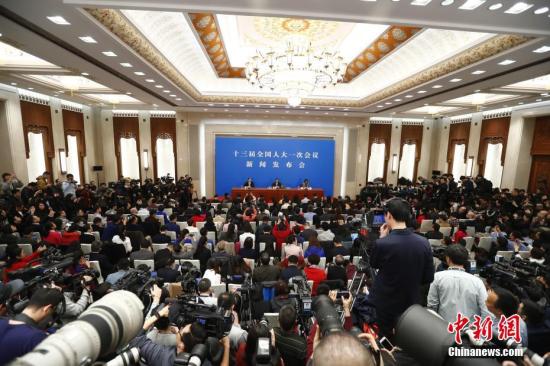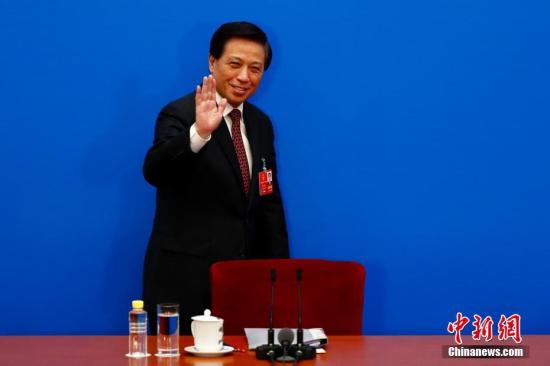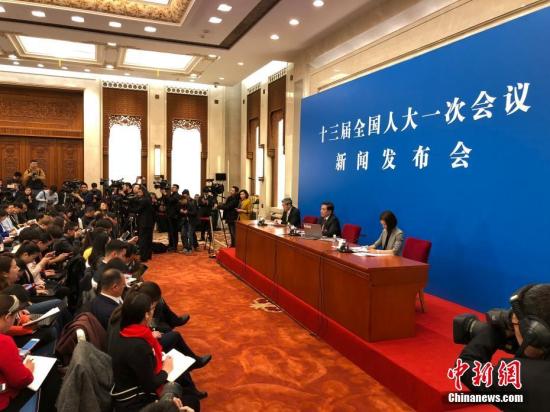The first session of the 13th National People’s Congress held a press conference, and Zhang Yesui responded to hot spots.
Source: CCTV
Chinanews. com client March 4 th The press conference of the first session of the 13 th National People’s Congress was held on the 4 th. Zhang Yesui, spokesman of the conference, answered questions from Chinese and foreign journalists on the agenda of the conference and the work of the NPC. At the press conference, Zhang Yesui responded to hot topics such as government institutional reform, supervision law, real estate tax law, China’s defense budget, and Sino-US relations.
[Meeting schedule: there are 10 agendas from March 5th to 20th]
Zhang Yesui introduced that the congress will open on the morning of March 5 and close on the morning of March 20, with a duration of 15 and a half days, which is slightly longer than the first session of the 12th National People’s Congress, which is mainly determined by the agenda of the congress.
There are ten agendas for this conference. The first to third items are to review the government work report and review the plan report and budget report. The fourth and fifth agendas are to consider the draft constitutional amendment and the draft supervision law. The sixth to eighth agendas are to review the work reports of the National People’s Congress Standing Committee (NPCSC), the Supreme People’s Court and the Supreme People’s Procuratorate. The ninth agenda is to consider the State Council’s institutional reform plan. The tenth agenda is to elect and decide on the appointment of members of state institutions.

[Deliberating and adopting constitutional amendments is an important task of the General Assembly]
After 14 years, the Constitution will be revised for the fifth time. Zhang Yesui said that an important task of this congress is to revise some contents of the Constitution, and to review and pass constitutional amendments.
He pointed out that amending the Constitution is a major event in the country’s political life and a major legislative activity that concerns the overall situation. The principles of amending the Constitution this time are as follows: First, adhere to the leadership of the Party, adhere to the rule of law in Socialism with Chinese characteristics, and adhere to the correct political direction. Second, in strict accordance with the law and procedures. Third, fully carry forward democracy, build consensus extensively, and ensure that it reflects the will of the people and is supported by the people. Four, adhere to the principle of partial revision of the constitution, not major changes, so as to comply with the requirements of the development of the cause of the party and the people, and follow the law of the development of constitutional laws to ensure the continuity, stability and authority of the constitution.
[Response "How to reform the government institutions?"】
On the question of how to reform government institutions, Zhang Yesui pointed out that this congress will listen to and consider the State Council’s institutional reform plan, and the State Council’s institutional reform plan is an important part of the party and state institutional reform plan, with the goal of building a functional system of party and state institutions with complete systems, scientific norms and efficient operation. This draft will be explained at the fourth plenary meeting on March 13th.
[the National Supervisory Commission (NSC) is the anti-corruption work organization with China characteristics]
Talking about the formulation of the supervision law and the establishment of the National Supervisory Commission (NSC), Zhang Yesui emphasized that the National Supervisory Commission (NSC) is an anti-corruption working institution with China characteristics. The State Supervision Commission and the Central Commission for Discipline Inspection are co-located and perform two duties of discipline inspection and supervision. The supervision law is the national legislation against corruption.
He said that it is of great and far-reaching significance to strengthen the party’s unified leadership over anti-corruption work, build an authoritative and efficient supervision system, and promote the modernization of the national governance system and governance capacity by formulating the supervision law, implementing institutional innovation and organizational innovation, and upgrading the practices and experiences that have proved effective in practice into legal systems.

[Talking about environmental protection: there were indeed more blue sky and white clouds in Beijing in the past year]
Speaking of environmental protection, Zhang Yesui said that in the past year, there were indeed more blue sky and white clouds in Beijing.
He said that in 2018, the National People’s Congress Standing Committee (NPCSC) will continue to pay close attention to the environmental protection work, formulate the law on the prevention and control of soil pollution, revise the law on the prevention and control of environmental pollution by solid waste, review the annual report on the state of the environment and the completion of environmental protection objectives, carry out law enforcement inspections on the law on the prevention and control of air pollution and the law on marine environmental protection, and strive to provide a solid legal guarantee for winning the battle against pollution.
[Strive to complete the preparation for submitting the real estate tax legislation for deliberation as soon as possible]
What is the progress of real estate tax law aimed at social concern? Zhang Yesui responded that speeding up the legislation of real estate tax is an important task put forward by the CPC Central Committee, which was drafted by the the National People’s Congress Standing Committee (NPCSC) Budget Working Committee and the Ministry of Finance. At present, the work of drafting and improving the draft law, demonstrating important issues and soliciting opinions internally is being accelerated, so as to complete the preparatory work for submitting it to the Standing Committee for initial consideration as soon as possible.
He said that this year, the farmland occupation tax law, vehicle purchase tax law, resource tax law, etc. will also be formulated, and the tax collection and management law will be revised.
[China’s moderate increase in defense investment in recent years is still lower than that of major countries in the world]
With regard to China’s defense budget, Zhang Yesui responded that in recent years, China has moderately increased its defense investment, a considerable part of which is to make up for the lack of investment in the past, mainly for updating armed equipment, improving the living conditions of soldiers and training and living conditions of grass-roots units.
He emphasized that China’s defense investment level is lower than that of major countries in the world, no matter from the proportion of defense budget to GDP, national fiscal expenditure or per capita. China has always adhered to the path of peaceful development and pursued a defensive national defense policy. The development of China will not pose a threat to any country.
On Sino-US Relations: Never sit idly by and watch China’s interests get hurt.
Talking about Sino-US relations, Zhang Yesui said that Sino-US economic and trade relations are essentially mutually beneficial and win-win. The volume of trade between the two countries can be said to be huge. Last year, the bilateral trade volume between China and the United States exceeded 580 billion US dollars, so it is not surprising that there are some frictions. China does not want to engage in a trade war with the United States, but we must not sit idly by and watch China’s interests get hurt.
He emphasized that China and the United States have different social systems, historical cultures and stages of development. It is normal for the two sides to have different views or even differences on some issues, but these differences and differences do not necessarily lead to confrontation. The key is that both sides should treat each other’s strategic intentions objectively and accurately and grasp the development direction of bilateral relations. If policies are formulated based on wrong judgments or assumptions, it will damage the relations between the two countries and bring consequences that neither side wants to see.

[It is not in the interest of either side to have war and chaos on the Korean Peninsula]
Regarding the situation on the Korean Peninsula, Zhang Yesui responded that the DPRK and the United States are the main parties to the Korean Peninsula issue. If the DPRK-ROK relations and the DPRK-US relations are compared to two wheels, we hope that the DPRK-US relations will continue to turn, and we hope that the DPRK-US relations will turn as soon as possible. In other words, we hope to see the DPRK and the United States start dialogue as soon as possible.
Zhang Yesui emphasized that both the DPRK and the United States have made some positive statements recently. China’s position on the peninsula issue is consistent and clear, that is, we insist on realizing the denuclearization of the peninsula, maintaining peace and stability on the peninsula, and solving problems through dialogue and consultation. War and chaos on the peninsula are not in the interest of either side. China will maintain close communication with relevant parties, further increase efforts to persuade peace and promote talks in accordance with the "double suspension" initiative and the idea of parallel tracks, and strive to resolve the Korean Peninsula issue through political and diplomatic means.
[The Belt and Road Initiative is open to all interested countries]
In response to a media question that some people think that the Belt and Road Initiative is a geostrategic tool of China, Zhang Yesui refuted this view, saying it was a misunderstanding of the Belt and Road Initiative.
He said that the "Belt and Road" is an economic cooperation initiative that focuses on interconnection and aims at mutual benefit and win-win. It is hoped that by complementing each other’s advantages, it will create more opportunities for world economic growth and common development of all countries. The principle of "Belt and Road" is to discuss, build and share, and all participants are equal partners. The Belt and Road Initiative is an open and inclusive platform that does not exclude or target any country and is open to all interested countries.
[Refuting "China’s export of China model is to change the international order"]
A reporter mentioned that China has vigorously advocated building a community of human destiny in recent years, and also proposed to provide China’s plan and China’s wisdom for solving human problems. However, some critics worry that China’s China model is to change the existing international order and rules, and Zhang Yesui also refutes it.
He stressed that China will stick to its own path, neither importing foreign models nor exporting China models, and will not ask other countries to copy China’s practices. Of course, if some countries are interested in China’s development experience and practices, we are willing to discuss and share with them, but we will never impose them on others. On the issue of international order, we are not trying to reinvent ourselves and engage in subversion and substitution, but we must persist in being the maintainer and builder of the international order. (End)